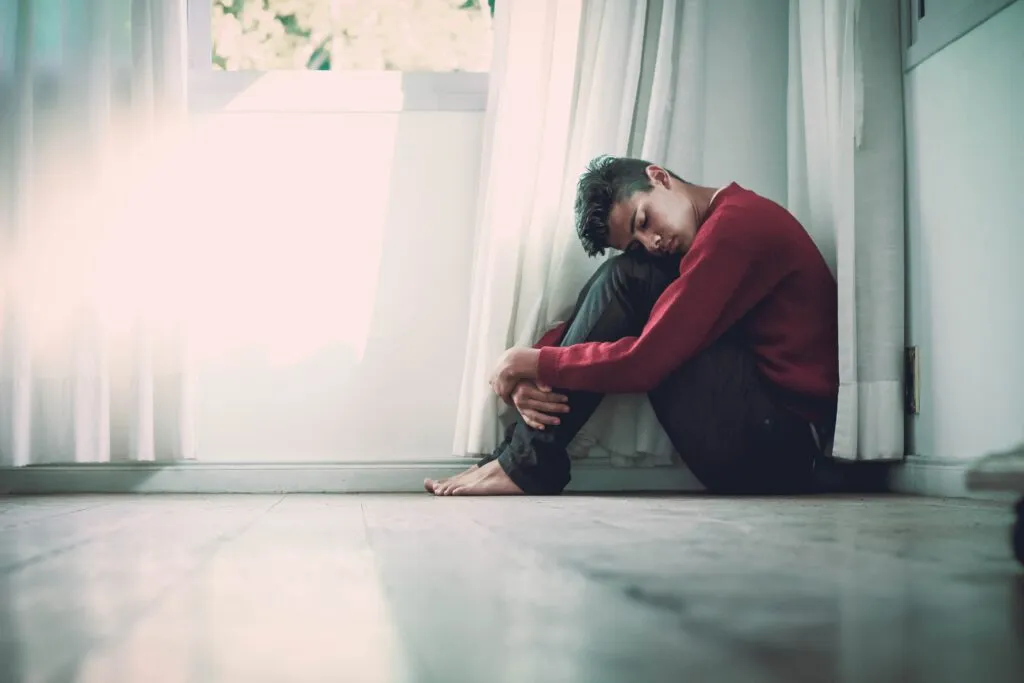3 Reasons Men
Aren’t Reporting
Sexual Assault
Apr 28, 2023 | By: Hope for the Journey

Until the past thirty years, society did not take notice of sexual abuse against boys and men. This all changed in the 1980s due to church scandals and Boy Scout allegations filling the headlines. Male survivors of sexual abuse, trauma, and assault face a unique dilemma in which they risk further victimization and being re-traumatized when seeking help. Old-fashioned views about gender tell us that masculinity equals a high desire for and a need for sexual validation. Due to these outdated attitudes, survivors’ claims end up dismissed, ignored, or even ridiculed by the systems that are supposed to protect them.
Sexual abuse, regardless of gender, has been linked to depression, self-hatred, anger, intimacy issues, and difficulty relating to others. Discrimination is evident even in the way laws regarding rape are written, in which only issues relating to women and female anatomy are described. Male survivors need our support and compassion, and the first step is understanding why this population has been neglected for so long. Let’s break it down.
Myths About “Male Rape”
There are countless “rape myths” that affect how male survivors, and society, view their experience.
- “Men can’t be raped.”
- “Only gay men are victims/perpetrators.”
- “Men are not affected by rape the same way women are.”
- “Male rape turns men gay.”
- “Men love sex, it doesn’t matter how it happens.”
As a result of these myths, men blame themselves for what happened or are less likely to frame what happened to them as sexual abuse, assault, or rape. There is a stereotypical idea that it is in men’s biological wiring to constantly think about and want sex more than women do. Because of this, there is a misguided notion that they should, and would, appreciate any sexual encounter, regardless if it was consensual or not.
Since the majority of perpetrators are men, victims might even question their sexuality if they experienced an involuntary ejaculation or became erect during the abuse. The myth that only gay men are raped leads to victims keeping quiet for fear of being labelled as homosexual, and even beginning to wonder if they in some way wanted it.
Reason #1: Seeking Help Can Cause Further Shame
One of the more startling statistics linked to how society views male sexual trauma involves the agencies determined least likely to help a man reporting rape: law enforcement and rape crisis lines. Law enforcement agencies are consistently criticized for prejudice against minorities, including the LGBT community and therefore, male survivors are lumped in with these groups due to their perceived homosexuality. Crisis hotlines, which tend to be female-driven and operate through a feminist lens, may hold the belief that rape is a problem of male aggression and toxic masculinity, therefore male survivors are treated with less empathy or disregarded entirely.
Research shows that the average delay in disclosure is more than 20 years, and it takes almost 30 years for most men to feel comfortable discussing it further. Men are less likely to report if the perpetrator was a relative, and because they are afraid of looking gay. The rates themselves may not give an accurate reflection of how many men on average experience sexual abuse, due to the aforementioned male rape myths and victims not interpreting what happened to them as abuse. Studies show that men’s rates of disclosure are about 26%, compared to women at 64%.

Reason #2: Male Anatomy Complicates Legal Proceedings
Men also face a specific complication that makes their cases harder to defend, especially in a legal setting, when they are the victims of unwanted sex: the male anatomical response. Studies show that men are capable of getting erections and even achieving orgasm when under extreme stress. The self-reporting of such a physiological response has led to case dismissals, because if a man reports becoming aroused and ejaculating, many assume that the act was consensual on some level.

Reason #3: Long-Term Effects on Mental Health
Despite the widely held belief that men are not as affected by rape as women are, researchers suggested that male rape is one of the highest causes of post-traumatic stress disorder among men. Men with a history of sexual abuse are at risk for health problems like major depressive disorder, substance abuse, anger management problems, and even suicide. Male survivors can also experience problems developing intimacy with partners and struggle with feelings of alienation. In extreme cases, sexual dysfunction can occur as a result of negative feelings associated with sex; agoraphobia has been reported in men who find themselves constantly in fear of being re-victimized. Aggression, irritability and rage problems are also common in men. It is easier for men to funnel unwanted or repressed feelings through anger and lash out instead of talk about their depression.
There is no doubt that sexual trauma has lasting effects on any person and, truth be told, men are more often the perpetrators in these situations. Male aggression, misogyny, and toxic masculinity are very real problems in the world, but we are forgetting that men can be victims of this, too. As much as we need to teach boys not to be aggressors, it is equally as important that we help men heal and stop the cycle of abuse.
Meet Our Team!
We recognize finding a therapist is HARD! That’s why we work to make getting started easy & staying in therapy to be worthwhile. Our therapists follow a proven method to help clients heal so they can feel alive and find joy.
You can learn more about our therapists here or to schedule an appointment look at our contact page today!
Other Services Offered At Hope For The Journey
We offer a variety of services from our Round Rock and Austin therapy offices. Mental health services include therapy for anxiety and depression, domestic violence, sexual assault, PTSD, and EMDR. Our team also provides support for family members of all ages with counseling for teens and young adults, children and tweens, couples, men, and parents/partners. Contact us today to learn more about our team and community involvement!
